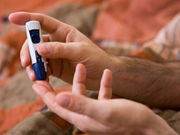Synchronized Prescription Renewal Process Saves Time
Renewing all patient's stable medications for 12 to 15 months can save time and money
Despite Progress, Mortality Still Risk Up in Patients With T2DM
Risks vary per age, glycemic control, and renal complications
Many Seniors May Be Overtreated for T2DM, Hypertension
Physicians may be concerned about malpractice claims or performance measure variables
Nearly 15 Percent of Plans Lack In-Network Specialists
Most commonly excluded specialists are in endocrinology, rheumatology, and psychiatry
Case of Lactic Acidosis With Metformin, Normal Renal Function
Patient presented to ER with coughing and shortness of breath, normal renal function
Vitamin D Supplementation Beneficial in Rheumatoid Arthritis
Improvement in disease activity for patients with vitamin D deficiency at baseline
Functional Foods Could Help With Long-Term Weight Loss
Positive results reported in rodent studies, but translation of results into humans is needed
USPSTF Urges Broader Screening for Type 2 Diabetes
Task Force advises testing overweight, obese people aged 40 to 70 for abnormal blood sugar
Physician Emphasizes Importance of Saying Thank You
Doctor reports feeling deeper connection to his patients; improvement in patient satisfaction score
Rapid Health Benefits Seen With Sugar Reduction in Children
Though calories remained same, obese children saw better BP, cholesterol, blood glucose levels



















